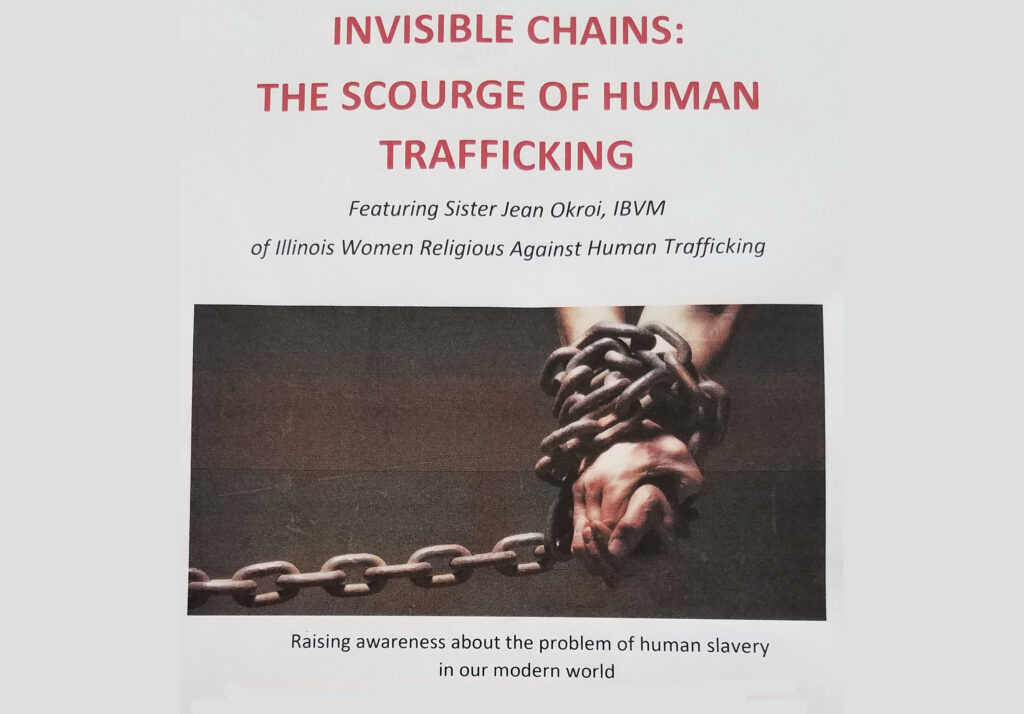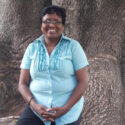We speak with Jean Okroi from Illinois, USA, where she works against human trafficking. Jean is a very curious woman: she enjoys learning about new ideas and meeting people from different cultures and backgrounds. You can tell by listening to her.
You are working in Illinois against trafficking. How did you start and what do you do?
My commitment to antitrafficking began 18 years ago. My interest began at a conference where they showed a documentary that touched me deeply. At the end of the documentary, I decided to narrow my justice work to one area only human trafficking. I then spent time learning about this heinous crime that was evolving.
Once I felt I had enough knowledge, I began doing presentations in parishes, universities, women’s groups, teachers, police departments, schools, etc. Seven years later, I invited other women religious to join with me. We created the Illinois Women Religious against Human Trafficking committee.
We used to think that “these things” don’t happen today, and even less in the “developed countries.” But what is the reality today?
Human Trafficking exists in all 50 of the United States. Those trafficked are the usually the most vulnerable people such as immigrants, runaways, economically poor, LGBTQ… They are all ages, cultures and colors. In the U.S., this crime involves the exploitation of persons in two main areas: labor (agriculture, restaurants, domestic servitude, construction) and commercial sex (prostitution, escort services, pornography, social media). Thousands of human trafficking victims are thought to be working in exploitive conditions in the United States. Some victims are brought into the country and others are U.S. citizens. They do the work, are abused and the trafficker gets rich!

What is exactly your main work?
The committee focuses on prevention by educating all age groups from eight-year-olds to senior citizens, organizing conferences, working with theatre groups, clergy. Recently, we contacted 271 parishes in Illinois. Parishes were phoned, received literature on human trafficking along with a letter from Cardinal Cupich. We have also contacted hotels in cities where the Super Bowl is being held and asked them what they have done about human trafficking and what do they need.
The other area that committee members work on is Advocacy. We do our best to protect and work for the rights of victims and survivors of human trafficking thru letter writing, phone calls, and petitions and contacting our government officials.
World supply chains need investigations. Consider the trouble an opaque supply chain can cause. Who makes, delivers the products we purchase from other countries? Children? What about the safety of the person producing the product? Environmental impact? Use of sweatshop labor? Suicides? Lastly, when a request is made, we do financially assist survivors.
World supply chains need investigations. Who makes the products we purchase?
How is it possible that this is still happening?
Greed perpetuates human trafficking. It is a $150,000,000,000 industry in the world fueled by cheap labor, services and commercial sex. When there is a DEMAND for cheap labor and sex, traffickers respond to that demand. They SUPPLY the purchasers in whatever way they see fit to fulfill the demand at the cost of another due to the traffickers GREED.
Recently, you had an intense experience in El Paso, Texas, a city situated on the border of USA and separated from Mexico by one river (Rio Bravo) one border and a few thousand dollars of income per capita. Which is the relation between migration and trafficking?.
My work in EL Paso was that of a volunteer. When I was there the organization I worked with was receiving forty to one hundred people each day from Central America. These people arrived with no luggage or backpack just a small plastic bag from a food store holding their possessions. Immigration personnel removed belts and shoelaces from every person including little children. One mother was frantic! Immigration had taken her son. These people traveled hundreds of miles with simple desires for a job, education and a better future for their families. Each one had a sponsor in the U.S. Some immigrants had a legal visa and signed on to a single employer in the U.S. Unfortunately, a few of these employers are traffickers and would use/abuse these people.
We can feel the passion you put into what you do!. And we would like to know more about your life as an IBVM sister and your expectations for Union. So, how did you get to know the Congregation?
Several people in my family including my mother were educated by the IBVM sisters. I followed in their footsteps for twelve years. After graduation from Loretto Academy I entered the Institute.
What inspires you? How does Mary Ward vision interconnect with your values and life?
Mary Ward’s vision is not only inspiring but contagious. She was no ordinary woman. Her sense of justice, freedom, ability to speak truth to power is the Gospel challenge for all of us. She was a woman undeterred by disappointment and believed “Women in time to come will do much.” She took giant steps in creating a women’s religious congregation governed by women. Her courage and vision mirror the desire and actions for women today. Mary Ward’s steadfast relationship with her God enabled her to not give in to the opposition or give up her dream.
My expectation is that Union will be transformative, an inner movement of opening one’s heart
What do you expect from the Union?
The thought of Union excites me. My expectation is that Union will be transformative, an inner movement of opening one’s heart to all that will come rather than just an external organizational change. Hopefully, this transformation involves the whole Mary Ward family, every sister, Companion and friend listening, sharing and praying together while creating a new consciousness of Mary Ward’s dream in this 21st century.


